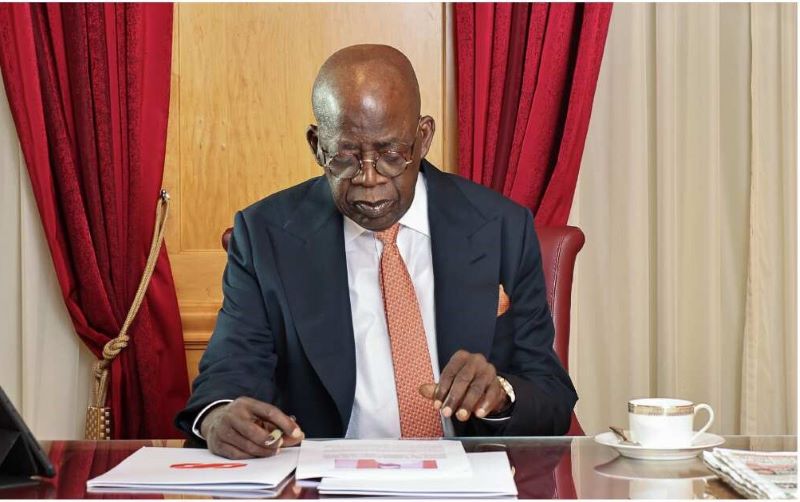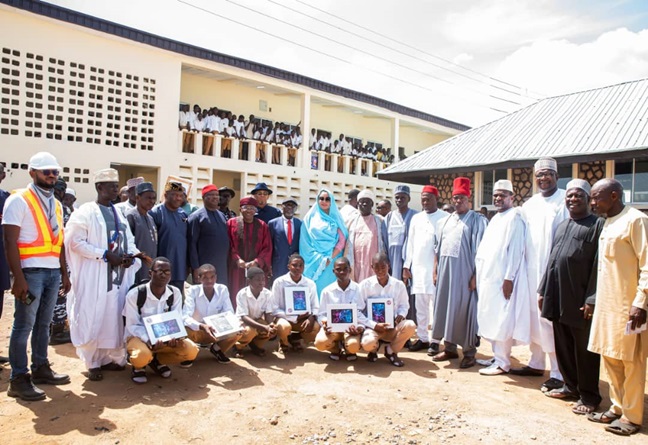Legislature
Bill prohibiting all forms of violence against human persons Scales Second Reading

A bill that is seeking to eliminate all forms of violence against persons, in private and public life, has scaled second reading at the Senate.
Sponsored by Senator Isah Jibrin Echocho, (APC) Kogi East, the Bill is entitled; A Bill for an Act to Repeal the Violence Against Persons (Prohibition) Act 2015, and Enact the Violence Against Persons (Prohibition) Bill, 2024 to eliminate violence in private and public life, prohibit all forms of violence against persons ad ttqqo provide maximum protection and effective remedies for victims and punishment of offenders; and for related matters, 2024 (SB. 368)
After the bill scaled second reading yesterday in the Senate, the President of the Senate, Senator Godswill Akpabio, referred it to the Senator Mohammed Monguno, APC, Borno North led Senate Committee on Judiciary, Human Rights and Legal Matters to report back in six weeks.
In his lead debate on the general principles of the bill, Senator Echcho said,
“Due to the far-reaching nature of this Bill, let me crave your indulgence to extensively highlight the background, which I believe will not only provide a proper context for this legislative initiative, but also motivate the National Assembly to accelerate the legislative process in enacting this Bill.
“This Act was enacted in 2015 against the backdrop of the rising cases of violence, especially domestic violence against women.
“The initial Bill sought protection for women from (male domination) violence. In the face of opposition to its obvious gender bias nature, the promoters renamed it, tinkered with some of its provisions, introduced seemingly gender-neutral language, and successfully obtained its passage.
“It’s explanatory memorandum states that it prohibits all forms of violence against persons in private and public life and provides protection and remedies for victims and punishment of offenders. Upon close scrutiny of the Act, it becomes obvious that it contains provisions that are inimical to the realisation of its objectives.
“Going through the provisions of the Act, it is obvious that it is plagued by substantial and drafting challenges. This underscores the necessity for a holistic reform of the Act to bring the provisions in line with the realities of societal change and drafting standards to effective dispensation of justice.
Some of the major areas of concern in the Act according to him, included several strict liability offences in the Act.
“These are instances where mental element (mens rea) is not needed, but only the physical element, which is all required to complete the offence. This therefore calls for a review to introduce elements of intention.
“The punishments of fine and imprisonment in the Act have become infinitesimal to have meaningful deterrent effect. This is particularly so in view of the current economic realities in Nigeria.
“In section 1 of the Act, the offence of rape needs particular attention. There is need to make a distinction between absence of consent, and consent obtained by fraud, undue influence, and other unlawful means.
“The Act contains inadequate provisions for compensation of the victims of violence. The penal focus is on fines and imprisonment, with little on compensation. In addition to the punishments, it is better, by way of reparation for victims, to make adequate provisions relating to compensation.
“The grievous nature of the certain offences in Act, especially section 22(1), makes the punishment provided inadequate. In view of the rampant cases of chemical attacks, such as acids and other substances, offenders under this section should not be given an option of fine. Similarly, the term of imprisonment needs an upward review.
“The Act does not create a Victims Support Fund to cater for victims of violence, and provide for its composition, funding and management.
“Section 27 of the Act, which vests jurisdiction in the High Court of the Federal Capital Territory, creates crisis of interpretation. Under the provision, the High Court of the Federal Capital Territory needs to be “empowered by an Act of Parliament” to exercise jurisdiction. This is certainly not the legislative intent therein. Consequently, the component requiring empowerment by an Act of Parliament is unnecessary. There are instances of derogatory expressions in the Act. An example is “mentally retarded” used in section 28(4). This needs to be replaced with a subtle legislative language.
“There are many cases of wrong cross referencing in the Act. The implication is that the operators of the Act run into difficulties when it comes to implementation. This opens a floodgate of litigation, which can be avoided by legislative option.
“The use of the terms “shall” and “may” in some sections of the Act do not convey legislative intent. Those terms are used haphazardly without due consideration of their outcomes. For example, in section 33(1), it is provided that “Whenever a court issues a protection order, the court shall make an order- (a) authorizing the issue of a warrant for the arrest of the respondent, in the prescribed form; and (b) suspending the execution of such warrant subject to compliance with any prohibition, condition, obligation or order imposed under section 31 of this Act.” The implication of the use of “shall” is a mandatory effect, which could not have been the legislative intent. The word “may” is more appropriate in the circumstance.
“In section 34, a strange “commissioner” is introduced for the purpose of making an application for variation or setting aside of a protection order. This riddles the provision with confusion, as ‘commissioner’ does not appear anywhere before and after this section. Besides, ‘commissioner’ is not defined in the interpretation section.
“The Act makes reference to legislations that are already repealed. An example is section 40, which makes reference to the Companies and Allied Matters Act, 1990. The current law is Companies and Allied Matters Act, 2020.
“This Act is notable for its innovations towards addressing violence in all ramifications. However, the several challenges and inadequacies inherent in it, call for urgent legislative action to reposition the legislation for efficiency.
Legislature
NASS modifies NDLEA Act, Prescribes Life Imprisonment for Drug Traffickers

The National Assembly has modified the National Drug Law Enforcement Agency (NDLEA) Act to prescribe life imprisonment for individuals found guilty of storing, transporting, or concealing illicit drugs and substances.
The amendment was adopted on Thursday during plenary, presided over by Deputy Senate President Barau Jibrin, following broad support from the senators.
The amendment reflects a harmonised position of the Senate and the House of Representatives on Section 11 of the NDLEA Act.
The House had earlier passed an amendment prescribing life imprisonment for drug traffickers, while the Senate had proposed the death penalty.
To reconcile the differences, a conference committee of both chambers was convened. Senator Tahir Monguno, Chairman of the Senate Committee on Judiciary, Human Rights, and Legal Matters, presented the harmonised version to the Senate.
He urged lawmakers to adopt the House’s position of life imprisonment, arguing that enforcing the death penalty could lead to the execution of over 900 accused persons currently awaiting trial for drug-related offenses.
The Deputy Senate President who presided over the plenary had put the resolution to a voice vote, and the majority of senators supported the amendment.
The approved version stipulates life imprisonment for offenders.
The amended section now reads:
“Anybody who is unlawfully involved in the storage, custody, movement, carriage, or concealment of dangerous drugs or controlled substances and who, while so involved, is armed with any offensive weapon or is disguised in any way, shall be guilty of an offence under this Act and liable on conviction to be sentenced to life imprisonment.”
This amendment aims to strengthen the fight against drug trafficking while addressing concerns over human rights and the judicial implications of the death penalty.
The move is part of efforts to curb the growing menace of drug trafficking and its adverse effects on Nigerian society. According to Senator Monguno, the life imprisonment penalty strikes a balance between deterrence and humane judicial practice.
With the amendment, the NDLEA now has a robust legal framework to prosecute offenders and combat drug-related crimes effectively.
Legislature
President Tinubu urges Senate to approve ₦1.767trn External Loan

President Bola Ahmed Tinubu has formally requested the National Assembly’s approval for a $2.209 billion (₦1.767 trillion) external borrowing plan to finance part of the ₦9.17 trillion fiscal deficit in the 2024 budget. The loan, included in the 2024 Appropriation Act, is critical to the government’s broader strategy for economic recovery and growth.
In a letter to Senate President Godswill Akpabio, President Tinubu noted that the borrowing aligns with the provisions of Sections 21(1) and 27(1) of the Debt Management Office (DMO) Establishment Act, 2003. He also indicated that the Federal Executive Council (FEC) had approved the plan.
The President explained that the funds would be sourced through Eurobonds or similar external financial instruments. A detailed summary of the loan’s terms and conditions accompanied the letter to guide legislative scrutiny.
“This borrowing is necessary to address the budget deficit and fulfill our fiscal strategy for 2024. Swift approval will enable us to move forward with mobilizing these funds,” the President stated, emphasizing the urgency of the request.
Senate President Akpabio referred the matter to the Committee on Local and Foreign Deb
Legislature
Senator Natasha Transforms Kogi Central Schools with 5,000 Digital Learning Devices

By Isah Bala
Access to quality education is a cornerstone of societal progress, and Senator Natasha Akpoti-Uduaghan is embodying this vision by bringing transformative educational tools to Kogi Central. In a groundbreaking initiative, the senator recently provided 5,000 digital learning devices to public primary and secondary schools in her district, aiming to bridge the digital divide and set a new educational standard.
The devices, unveiled at Abdul Aziz Attah Memorial College (AAAMCO), are preloaded with the Nigerian curriculum from UBEC and internationally acclaimed educational resources, including Khan Academy and Discovery Kids. Through this initiative, students will experience interactive learning, enabling them to explore subjects in depth, enhance digital literacy, and engage with complex topics in a hands-on way.
This project is just the beginning of Senator Natasha’s ambitious plan to make “smart schools” the norm in Kogi Central. She envisions a future where every child in her district has equal access to digital learning, stating, “My dream is to equip all public primary and secondary schools in Kogi Central with digital learning devices before the end of my tenure in 2027.”
Beyond device distribution, the senator’s initiative includes UBEC-led teacher training to ensure educators are equipped to integrate these tools into their classrooms effectively.
With this dual approach of student and teacher empowerment, Senator Natasha is laying a foundation that will support digital literacy and skill development for years to come.
Senator Natasha’s commitment to educational advancement represents a significant step forward for Kogi Central, ensuring that young students have access to the tools they need to succeed in an increasingly digital world. This initiative marks her dedication to the constituency that entrusted her with this mandate.
-

 Crime1 year ago
Crime1 year agoPolice nabs Killer of Varsity Lecturer in Niger
-

 News10 months ago
News10 months agoFCT-IRS tells socialite Aisha Achimugu not to forget to file her annual returns
-

 Appointment1 year ago
Appointment1 year agoTinubu names El-Rufai, Tope Fasua, others in New appointments
-

 News From Kogi1 year ago
News From Kogi1 year agoINEC cancells election in 67 polling units in Ogori-Magongo in Kogi
-

 News From Kogi1 year ago
News From Kogi1 year agoEchocho Challenges Tribunal Judgment ordering rerun in 94 polling units
-

 News1 year ago
News1 year agoIPOB: Simon Ekpa gives reason for seperatists clamour for Biafra
-

 Metro8 months ago
Metro8 months ago‘Listing Simon Ekpa among wanted persons by Nigeria military is rascality, intimidation’
-

 News10 months ago
News10 months agoKingmakers of Igu/ Koton-Karfe dare Bello, urge him to reverse deposition of Ohimege-Igu





